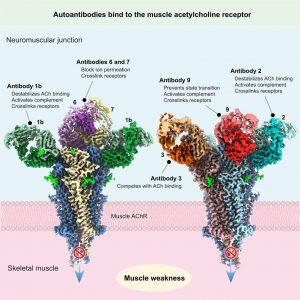Myasthenia gravis is a chronic autoimmune disease that causes muscle weakness, often affecting muscles responsible for eye movement, facial expressions, and even mobility. The condition is triggered by autoantibodies—immune system proteins that mistakenly target the body’s own tissues.
Researchers have uncovered a surprising diversity in how the autoimmune disease myasthenia gravis (MG) disrupts nerve-to-muscle communication (Figure 1).
The study leveraged cryo-electron microscopy (cryo-EM) to visualise how antibodies from MG patients interact with acetylcholine receptors (AChRs), which are critical for muscle contractions.
In MG, these antibodies target AChRs, interfering with the signals that nerves send to muscles. The standard treatment involves boosting acetylcholine or suppressing the immune system, but responses vary dramatically from patient to patient.
Using cryo-EM and functional assays, the researchers analysed autoantibodies from six MG patients and revealed that these antibodies disrupt AChRs through multiple distinct mechanisms:
- Some blocked acetylcholine binding, preventing signal transmission.
- Others activated the immune complement pathway, which destroys the receptors.
- All disrupted AChR ion channel function, which is vital for proper muscle contraction.
This research challenges older models that assumed MG antibodies all acted the same way. The structural insights could help design targeted therapies that neutralize specific antibody interactions without broadly suppressing the immune system.
These findings could shift how clinicians approach autoimmune neuromuscular disorders, with future treatments tailored to individual antibody profiles.
Journal article: Li., H, et al, 2025. Autoimmune mechanisms elucidated through muscle acetylcholine receptor structures, Cell.
Summary by Stefan Botha











